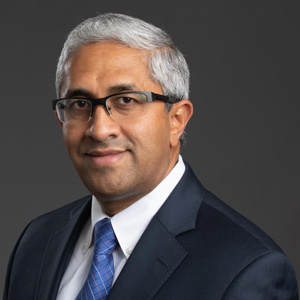Asokumar Buvanendran, MD

Asokumar Buvanendran, MD
Academic Appointments
Endowed Chair, William Gottschalk Chair of Anesthesiology
Chairperson, Department of Anesthesiology, Rush University Medical Center
Professor of Anesthesiology, Rush Medical College
Education
Fellow, Pain Management (Rush University, Chicago)
Jan 1999 – Dec. 1999
Resident, Anesthesia (Rush University, Chicago)
Jan 1995 – Dec. 1998
Research Associate/Fellow, Anesthesia (University of Toronto)
Sept 1991 – Dec. 1994
Society Memberships
Association of University Anesthesiologist (AUA)
2007 to present
American Society of Regional Anesthesia (ASRA)
1997 to present
Illinois State Medical Society (ISMS)
2002 to present
American Society of Anesthesiologist (ASA)
1995 to present
Illinois State of Anesthesiologist (ISA)
1995 – Lifetime member
Editorial Boards
Executive Editor, Regional Anesthesia and Pain Medicine
2014 to Present
Journal of Clinical Anesthesia
2007 – on going
Member of National Task Forces/ Working groups
- Member: The Joint Commission (TJC): Acute Pain Assessment and Management Technical Advisory Panel. 2016 – 2017
- Member of ADOPT Guidance project with CDC and The Joint Commission 2016 – 2018 for surgical infection in ambulatory surgery. Representing ASRA
- Writing panel member to develop consensus for “guidelines on surgical management of osteoarthritis of the knee” from AAOS. (January 2016)
- ASA invited Representative to CDC: Opioids prescribing Guidelines for USA. 2015. Involved with the final product and release of this document. Stakeholder reviewer
- ASA representation at NIH: Pathways to Prevention Workshop: The Role of Opioids in the Treatment of Chronic Pain; Sept 29th-30th 2014
- ASA representative: Member of the National Board of pharmacy (NABP) on drug abuse 2014 – 2015.
- Safe use of steroid use for epidurals injections. A panel set up by FDA safe use Initiative.
- Multi-Society Pain Working group (MPW) on LCDs for pain procedures. Represent ASRA and author of LCD for Spinal cord stimulation from the ASRA group in collaboration with ASA.
- ASA member for Review of Sacroiliac joint anatomy and treatment guidelines with ISIS
- Response to LCD reviews for Local Medicare care for pain management
- ASA and ASRA Representative to NANS multi-society meeting
- National member of PQRS Review for Pain Measures
102 Peer Reviewed Publications in International Journals
Rush Medical College Appointments
Faculty Council, Member (highest body for the Rush Medical College)
June 2015 to Present
University Council, Member (highest body for All Rush 4 Colleges)
Sept 2015 to Present
NIH Research Grants
Title:
Transition from Acute to Chronic Pain in Total Knee Arthroplasty Patients: Identifying Resilience and Vulnerability Profiles. (PI - multiple)
Period:
July 2019 – June 2023
Goals:
The major aim is to identify biomarkers for transition of acute to chronic pain after total Knee arthroplasty. This study will examine the psychological factors, functional MRI (fMRI), and genomics and proteonmics biomarkers for transition and resilience for patients undergoing surgery
Title:
New Non-Opioid Treatments for Acute and Chronic Pain: Mechanism of the Analgesic Effect of the Ketamine Metabolite, (2R,6R)-Hydroxynorketamine; Supplement grant to NIH/NCCIH. RO1 AT009680-01 (Co-I)
Period:
2019 –2021
Goals:
To demonstrate with pharmacological antagonists that the analgesic efficacy of (2R,6R)-HNK is α-amino-3-hydroxyl-5-methyl-4-isoxazole-propionate (AMPA) or N-methyl-D-aspartate (NMDA) dependent and does not involve opioid receptors in 4 validated models of pain
Title:
Evaluating specific and non-specific mechanisms in two distinct complementary/integrative interventions for chronic pain
Period:
2019 –2023
Goals:
This project examines the specific and non-specific mechanisms by which mindfulness training and spinal manipulation therapy work to produce favorable outcomes.
Title:
Predictors of Opioid analgesic responses and common endogenous Opioid Mechanisms (Co-I)
Period:
Sept 2011 – May 2016
Goals:
The major aim is to determine the degree to which an index of endogenous opioid function is related to exogenous opioid analgesic effects and to compare these associations in low back pain patients to those in healthy people.
Current Status:
Completed
Title:
Mechanisms of Psychosocial Chronic Pain Treatments (Co-I)
Period:
Sept – 2013 to June – 2018
Current Status:
IRB approved, recruiting
Title:
Reduced Opioid Analgesic Requirements via Improved Endogenous Opioid Function (Co-I)
Period:
April 2015 – 2020
Goals:
The major aim is to determine the degree to which an index of endogenous opioid function is related to exogenous opioid analgesic with and after exercise
Current Status:
IRB approved.
National Society Funding
Title:
Patients after minor surgery with Monitored Anesthesia Care – Is it safe Drive?
Agency:
Anesthesia Patient Safety Foundation (APSF).
Period:
Jan 2008 – 2012
Goals:
The major aim is to determine if new sedation, anesthetic and opioids drugs impair the driving of patients after surgery
Medical School Grants
Title:
Risk Factors and Mechanism for Prevention of Persistent Pain after Total Knee Replacement
Agency:
Pfizer Medical School Grant
Period:
Sept 2011 – June 2014
Goals:
The major aim is to determine the risk factors for chronic pain after TKA and preoperative risk factors. There is no therapeutic agent tested, but rather to understand the natural progression of acute pain to chronic pain and the risk factors.
Title:
Preoperative Cognitive Therapy for Reducing Persistent Postsurgical Pain after Total Knee Arthroplasty
Agency:
Pfizer medical school grant
Period:
Jan 2013 – Dec 2015
Goals:
The major aim is to determine if preoperative and continuous postoperative Cognitive Therapy (CT) via Skype, or a control group; can reduce the incidence of chronic pain after total knee arthroplasty in high risk patients with catastrophizing.
Title:
Improving functional outcomes and lowering health care costs by enhanced integration of primary care providers and pain medicine physicians for the management of chronic non-cancer pain patients.
Role:
Principal Investigator
Agency:
Pfizer Independent Grants for Learning & Change for Employing Integrated and Coordinated Multimodal-Therapies in a Primary Care Setting to Improve Outcomes and Optimize Healthcare Utilization for Patients with Chronic Pain
Period:
Jan 2014 – Dec 2016
Goals:
The major aim is to determine if chronic pain patients managed by primary care vs pain medicine specialist will make a difference in outcome at 6 months
